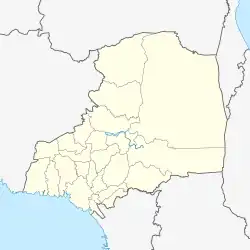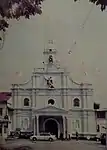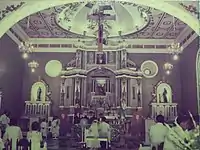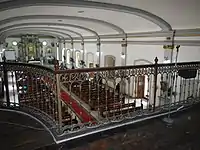| Diocesan Shrine of San Miguel de Mayumo | |
|---|---|
 Church facade in 2014 | |
 Diocesan Shrine of San Miguel de Mayumo .svg.png.webp) Diocesan Shrine of San Miguel de Mayumo .svg.png.webp) Diocesan Shrine of San Miguel de Mayumo | |
| 15°08′27″N 120°58′35″E / 15.140863°N 120.976465°E | |
| Location | Poblacion, San Miguel, Bulacan |
| Country | Philippines |
| Denomination | Roman Catholic |
| History | |
| Status | Parish church |
| Founded | 1725 |
| Dedication | Saint Michael, the Archangel |
| Architecture | |
| Functional status | Active |
| Architectural type | Church building |
| Style | Baroque |
| Completed | 1869 |
| Specifications | |
| Materials | Stone, Sand, Gravel, Cement, Steel |
| Administration | |
| Archdiocese | Manila |
| Diocese | Malolos |
| Clergy | |
| Archbishop | His Eminence José F. Advincula Jr., D.D. |
| Bishop(s) | Most Rev. Dennis C. Villarojo, D.D., Ph.D. |
| Priest(s) | Rev. Fr. Avelino A. Sampana |
| Assistant priest(s) | Rev. Fr. Juvenson C. Alarcon |
The Diocesan Shrine and Parish of San Miguel Arcangel, is a 19th-century, Baroque Roman Catholic church located along De Leon St., Brgy. Poblacion, San Miguel, Bulacan, Philippines. The parish church, with Saint Michael, the Archangel as patron saint, is under the jurisdiction of the Roman Catholic Diocese of Malolos.
History
.jpg.webp)
Parish history
It is believed that the town of San Miguel was initially established as a town under the province of Pampanga. The parish of San Miguel de Mayumo was founded years before 1607 as a visita of Candaba and was said to be declared an independent parish in 1725. However, some records tell that the parish of San Miguel was later annexed to Gapan in 1726 as a visita. It was also recorded that San Miguel de Mayumo was once annexed to Macabebe, also as a visita. On May 8, 2018, 3 days before his death, The late Bishop Jose F. Oliveros of the Diocese of Malolos celebrated his final mass in the parish[1]
Architectural history
There are no records as to who built the first parochial structures in San Miguel. Sources are also not clear as to whether Father Juan Tombo built or simply rebuilt the current church and convent. Father Francisco Arriola continued with the construction until it was complete in 1869. The Catholic cemetery is attributed to Father Arriola while the convent was constructed under Fathers Arriola, Tombo and Ortiz during their respective periods as minister of San Miguel. During World War II in 1941, the roof of the church nave collapsed.[1]
Architecture
The church of San Miguel is the only Spanish-era church in Bulacan with the belfry attached atop the façade pediment.[2] The church, with its predominantly Baroque features, has a two-level façade and a curved pediment surmounted by the rectangular belfry with a bulbous dome. The façade is primarily adorned by the paired pilasters and multi-edged cornices dividing the front into several sections. The base of the façade has two saint’s niches and a concrete porte-cochere that was a late addition into the structure and has replaced a previous one with Corinthian columns. The second level is pierced with an oculus flanked by two semicircular windows. A tableau depicting Saint Michael slaying the dragon adorns the central portion of the pediment.[1]
Gallery
 Church exterior, c. 1997
Church exterior, c. 1997 Church exterior, c. 2021
Church exterior, c. 2021 Exterior wall featuring buttresses
Exterior wall featuring buttresses Church interior, c. 1997
Church interior, c. 1997 Church interior, c. 2016
Church interior, c. 2016 Church interior from the choir loft
Church interior from the choir loft
References
- 1 2 3 Galende OSA, Pedro (1996). Angels in Stone: Architecture of Augustinian Churches in the Philippines (Second ed.). Manila, Philippines: San Agustin Museum. p. 113. ISBN 9719157100.
- ↑ Cabigas, Estan. "Visita Iglesia: The old churches of Bulacan, Part 1 of 2". simbahan.net. Retrieved 8 December 2014.
External links
 Media related to Saint Michael the Archangel Parish Church in San Miguel, Bulacan at Wikimedia Commons
Media related to Saint Michael the Archangel Parish Church in San Miguel, Bulacan at Wikimedia Commons
